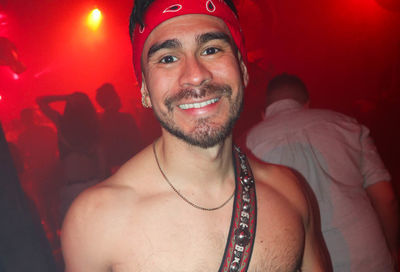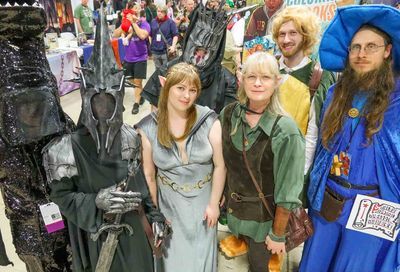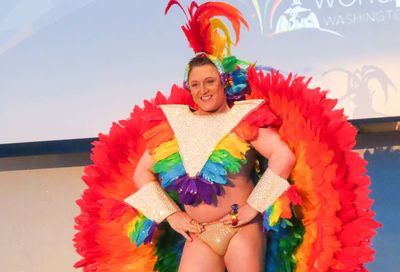Campus Radicals, Past and Present
Learning Curve
This is where I came out as a brainy dyke teen in Birkenstock sandals, fountain pen dripping with feminist ink: Washington, D.C. in 1980, on the very threshold of Ronald Reagan’s arrival in the White House and the decade of the AIDS epidemic. Coming out then was my queer generation’s personal dare, our collective challenge to the Moral Majority and to the many ultraconservative politicians who soon ringed our nation’s capital.
At eighteen, newly enrolled at American University, I began my higher education years in the climate of gay-baiting bills like the Briggs Initiative, the Human Life Amendment, and myriad government resolutions condemning homos and feminists — women like me. The gentlemen introducing these bills worked on Capitol Hill, a mere twenty-minute bus ride across town. Congressmen went home to the same Bethesda suburb where I lived with my parents. I walked amongst and, in all probability, went to movies alongside homophobic senators. Together, we shopped at Giant Food, biked along the C&O canal, watched Fourth of July fireworks on the Mall — me, my friends and the nice lawmakers naming us felons and sodomites.
My SAT scores assured me I was head and shoulders above my classmates, in the top two percent of the nation intellectually. Many colleges had begged me to enroll, drooling over my magical P-word: potential. Yet here in D.C., the most powerful men in the land were busily at work to keep high-achiever homos like me from making our national contribution as teachers, soldiers, parents.
Coming out in D.C. meant understanding gay and lesbian identity as a public persona and stance, as a political commitment that challenged every institution. Early in my sophomore year, I appeared on the locally-taped Charlie Rose show, where fundamentalists screamed abuse at our gay rights panel. The next day I was stopped by a male rabbinical student I considered a friend, who said, “I thought you had morals. You obviously need psychological help. ”
I nod when I revisit these memories. Ah, yes, the ’80s. We survived all that. Yet today’s headlines predict we’re in for a fresh round of the same, an era of rigid moralists at the political helm. So here we go again, into another administration of conservative Republicans resistant to gay rights, and I’m still wearing Birkenstocks. But now I’m on the other side of the professor’s desk.
Teaching hundreds of first-year college students at George Washington University and Georgetown, I find that many of my gay students are complacent about queer identity, content to party at Chaos and focus on pre-professional goals, not revolution. A few find their way to internships with organizations prioritizing gay and lesbian rights. Others, the budding poets, know their professor’s a big cheerful homo because they show up at Mothertongue every month and hear me slam erotica onstage. Am I them? Are they me? Are any of us “campus radicals “? Has a more tolerant climate been attained, reducing the need for protests?
For my gay and lesbian undergrads, private life will always blossom regardless of federal homophobia. We who embrace queerdom have always fallen in love or in lust, no matter who’s in charge. But what can I tell my students — straight and gay — as the country lurches to the right, with anti-gay politicians hungrily eyeing judicial appointments?
Gay civil rights issues contain blockbuster-sized questions I expect all my students to consider. Even the most assertively lavender students on any campus are dependent on straight allies to rise up in the political process and enforce equal protection under the law. We’re a minority. Should homophobia escalate, it’s not too far off the mark to hope for a wave of “righteous heterosexuals, ” as Nazi Germany had its “righteous Gentiles ” defying anti-Jewish views. Our futures are linked. This means that as a literate, well-educated, and active constituency, gay Americans are often forced to listen as others debate our rights. But until more openly gay and lesbian politicians are elected, we must hope that the non-gay majority will speak out in our favor.
This dependency hasn’t changed since I was in college, and it’s a dynamic that now fascinates my undergraduates. I remind my non-gay students that, sure, I hold the power to grade their tests and papers now; but in the larger world out there, they can vote me out of a job, strip away my right to raise a child, or to teach in public school. Will they stay on my side after college? I hope so.
What does it mean that after decades of struggle, I’m still the only one daring to be out in the classroom? Even in this most political of cities, gay students are often silent on campus, concerned about jobs, references and futures. I don’t expect every young homo to feel the profound call to direct action in the historical moment. I was personally aware, coming out in college, that gay D.C. and its political organizations beckoned just off campus, offering the real curriculum I’d need to negotiate my rights through young adulthood. The need for self-protective savvy in the legal years ahead is something I hope my students will discover on their own. And when they hit the streets they’ll easily find me at the pride march — grading their term papers on the go, amazed to be 41, and only slightly tired.
Bonnie J. Morris, Ph.D., is on the women’s studies faculty at George Washington University and Georgetown University. She can be reached at bmorris@metroweekly.net.
Support Metro Weekly’s Journalism
These are challenging times for news organizations. And yet it’s crucial we stay active and provide vital resources and information to both our local readers and the world. So won’t you please take a moment and consider supporting Metro Weekly with a membership? For as little as $5 a month, you can help ensure Metro Weekly magazine and MetroWeekly.com remain free, viable resources as we provide the best, most diverse, culturally-resonant LGBTQ coverage in both the D.C. region and around the world. Memberships come with exclusive perks and discounts, your own personal digital delivery of each week’s magazine (and an archive), access to our Member's Lounge when it launches this fall, and exclusive members-only items like Metro Weekly Membership Mugs and Tote Bags! Check out all our membership levels here and please join us today!


















